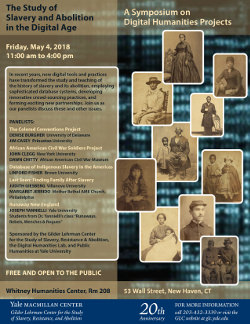Video and Livestreams of Selected Events
2017/2018
![]() Father Comes Home: A Civil War Odyssey
Father Comes Home: A Civil War Odyssey
This public panel, which marks the Yale Repertory Theatre’s production of Suzan-Lori Parks’s Father Comes Home from the Wars (Parts 1, 2 & 3), will discuss the ways in which theatre seeks to make sense of the present condition by mining America’s shifting conceptions of race and gender, its violent history of slavery, and its unfilled promises of freedom.
Moderated by Professor Daphne Brooks and bringing together historians, theatre studies scholars, and theater professionals, the panel will consider both Suzan-Lori Parks’s play as well as broader questions involving the ways in which playwrights and historians have creatively engaged with America’s past to better understand slavery, freedom, gender, and race.
![]() The Study of Slavery and Abolition in the Digital Age: A Symposium on Digital Humanities Projects
The Study of Slavery and Abolition in the Digital Age: A Symposium on Digital Humanities Projects
In recent years, new digital tools and practices have transformed the study and teaching of the history slavery and its abolition, employing sophisticated database systems, developing innovative crowd-sourcing practices, and forming exciting new partnerships. Join us on Friday, May 4th as our panelists discuss these and other issues.
![]() Panel Discussion: “Frederick Douglass at 200: The Life Behind the Times”
Panel Discussion: “Frederick Douglass at 200: The Life Behind the Times”
in honor of the 200th Anniversary of the birth of Frederick Douglass & the 20th anniversary of the founding of the Gilder Lehrman Center.
Frederick Douglass is one of the greatest American thinkers, writers, and orators of the nineteenth century. He is forever known in his words and his activism. Join the Gilder Lehrman Center for a discussion of that literary and political legacy, especially through the story of the personal life behind his turbulent times.
Scholars of Frederick Douglass will explore public and private dimensions of his life, including his daughter, three sons, and extended family; his two marriages, one of 44 years with Anna Murray Douglass and the other for 11 years with Helen Pitts Douglass; his relationships with European women, Julia Griffiths and Ottilie Assing; and his personal friendships, some rooted in fierce rivalry and some in enduring support, both in the United States and in England.
Book Talk: Ed Ayers, The Thin Light of Freedom: The Civil War and Emancipation in the Heart of America
At the crux of America’s history stand two astounding events: the immediate and complete destruction of the most powerful system of slavery in the modern world, followed by a political reconstruction in which new constitutions established the fundamental rights of citizens for formerly enslaved people. Few people living in 1860 would have dared imagine either event, and yet, in retrospect, both seem to have been inevitable.
In a beautifully crafted narrative, Edward L. Ayers restores the drama of the unexpected to the history of the Civil War. He does this by setting up at ground level in the Great Valley counties of Augusta, Virginia, and Franklin, Pennsylvania, communities that shared a prosperous landscape but were divided by the Mason-Dixon Line. From the same vantage point occupied by his unforgettable characters, Ayers captures the strategic savvy of Lee and his local lieutenants, and the clear vision of equal rights animating black troops from Pennsylvania. We see the war itself become a scourge to the Valley, its pitched battles punctuating a cycle of vicious attack and reprisal in which armies burned whole towns for retribution. In the weeks and months after emancipation, from the streets of Staunton, Virginia, we see black and white residents testing the limits of freedom as political leaders negotiate the terms of readmission to the Union.
![]() Panel Discussion: Confronting Coercion: Building Worker Power in the 21st Century
Panel Discussion: Confronting Coercion: Building Worker Power in the 21st Century
Panelists:
- Gerardo Reyes Chávez, Coalición de Trabajadores de Immokalee/ Coalition of Immokalee Workers (CIW): http://www.ciw-online.org/
- Fausto Garcia and Daniel Castellanos, National Guestworker Alliance: http://www.guestworkeralliance.org/about-nga/
- John Jairio Lugo, Unidad Latina en Acción: https://ulanewhaven.org/ula
![]() Disunion in Civil War America: Parallels for Today?
Disunion in Civil War America: Parallels for Today?
Today, American political culture is in need of historical grounding. The analysis and anxiety occurring in the wake of the November 2016 U.S. presidential election have prompted a search for historical models and parallels to help understand the contemporary moment of political upheaval, white supremacy, crises over immigrants and refugees, and possible realignments of political parties. For its 19th annual conference in November 2017, the Gilder Lehrman Center for the Study of Slavery, Resistance, and Abolition will examine the 1840s and 1850s as an earlier example of deep currents of fear and disorder within U.S. political culture and history. The conference will consider contemporary experiences of polarization in the United States, compared with what happened to the American political party system, political culture, realignment, voter turnout and suppression, and coalitions, during the two decades before the Civil War. Panelists will include historians, political scientists, journalists, and legal scholars, as we seek to link past and present in order to address big questions about history for a broad public. This conference is being organized in collaboration with Professor James Oakes of the Graduate Center of the City University of New York and Dr. Joe Murphy, National Endowment for the Humanities Fellow at the New-York Historical Society.





